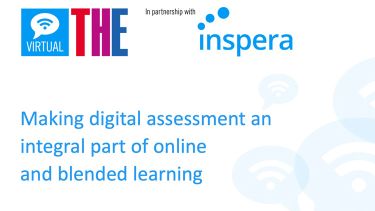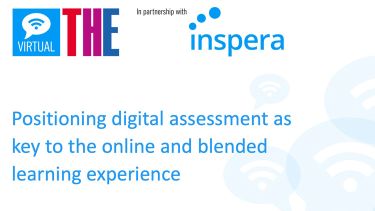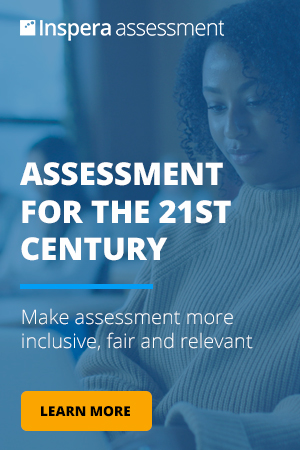Higher education pivoted to digital assessment during the pandemic, but once campuses reopen, what does the future hold for the traditional exam?
Higher education has learned a lot in the past year about its capacity for digital transformation, but as the sector looks to the future, how might digital assessment evolve in the years to come? Speaking at a Digital Universities Week session hosted by Times Higher Education in partnerships with Inspera, a market leader in online assessment and certification, the company’s UK general manager, Ishan Kolhatkar, addressed some of the challenges holding back the evolution of digital assessment in higher education.
Digital transformation is as much a cultural change as it is technological, and Kolhatkar identified a disconnect between attitudes to online learning and digital assessments.
“It always seems strange to me that we have VLEs [virtual learning environments] that allow people to learn digitally but all too often we say: ‘OK, to finish this module off, you need to go and sit in a cold gym hall for three hours with a pen and paper,’” Kolhatkar said. “People look at the fact that they can use digital tools and get their students using Office365 – which they use every day – as part of their assessments, in an exam setting.”
University leaders are now rethinking the exam format. Digital assessment is more than just proctoring, it is the chance for institutions to rethink and redesign assessment. “A lot of digital assessment became remote proctoring,” Kolhatkar said. “I think in some people’s minds the two things are now somewhat conflated.”
Whichever new methodologies are adopted, it is vital that all stakeholder concerns are addressed. “I think it is about finding the benefits for people rather than necessarily talking about the technology,” Kolhatkar said. Staff must have agency over their own workflow so they can adapt to new technologies at their own pace. Once faculty saw gains in efficiency, lingering doubts soon evaporated.
Traditional examinations might still have a future but the learning technologist community in higher education institutions now have the attention of administrators. Change is in the air. Might this lead to personalised assessment? There is not a lack of will or interest, Kolhatkar said, but it presents a challenge for institutions and students alike.
“The norm, the one that everyone is used to, where there is most support, is almost certainly going to be the one that is picked the most,” he said. But by working with institutions and professional, statutory and regulatory bodies to establish standards and practices, vendors can offer the technology and support to overcome such challenges as higher education establishes a digital future for assessment.
Watch the session on demand above or on the THE Connect YouTube channel.















